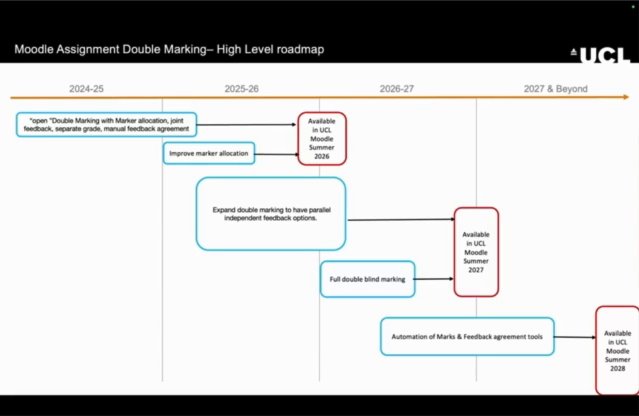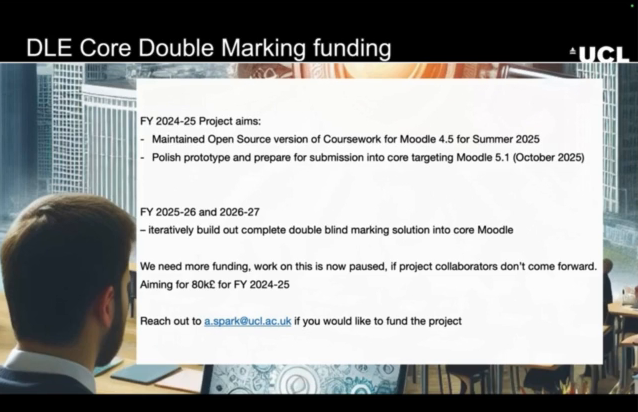Updated for 2026: While the original article mentioned only “double marking”, the scope for this project has been expanded to allow for more than two markers and is now named The Multiple Marking Project.
A Call for Collaboration to Improve Assessment in Moodle
The Moodle Multiple Marking Project, led by Alistair Spark, Principal Analyst Developer at UCL, is an exciting initiative aimed at enhancing Moodle’s assessment capabilities. With the support here at Catalyst IT, this project seeks collaboration and co-funding from institutions interested in advancing grading workflows in Moodle.

The Need for a Multiple Marking in Moodle
Following UCL’s successful launch of a SITS integration for Marks Transfer, they have been exploring ways to implement double marking functionality in Moodle. This development is essential for ensuring fair and transparent assessment processes across institutions. Accurate and transparent assessment is critical in education, yet many institutions struggle with the limitations of existing marking workflows in Moodle. Features like double-blind marking, sample marking, and moderation are essential for fair grading but are not yet fully integrated into Moodle Core. This project aims to address this gap by developing a robust, open source solution to support Multiple Markers that will benefit educators and students across the Moodle community.
Latest Progress
Since the project’s initial proposal, key milestones have been achieved:
- Completion of VLE Market Research – Watch the research presentation
- Development of a functional prototype – Watch here
- Secured buy-in from Moodle HQ and agreed on a path forward for project integration.
Project Goals & Milestones
The project has two key objectives:
- Short-Term Goal: Maintain and enhance the Coursework plugin for Moodle 4.5+, allowing institutions to implement advanced marking workflows immediately.
- Long-Term Goal: Develop and integrate open double marking directly into Moodle Core, creating a scalable, standardised assessment solution for all Moodle users.

The primary development aim now is to submit and polish the prototype code for inclusion in Moodle 5.1 Core. A prototype for open double marking is expected by Summer 2025, with further iterations towards double-blind marking and additional functionalities. If successfully integrated into Moodle Core, this feature could become widely available by 2026/27.
How Institutions Can Get Involved
“This project presents a unique opportunity for institutions to collaboratively shape the future of assessment in Moodle. By working together, we can ensure that double marking becomes a core feature, enhancing fairness and transparency in grading workflows.”
Alistair Spark, Principal Analyst Developer, UCL
UCL has already committed funding to this initiative, but to accelerate development, we’re inviting more institutions to join us in supporting this effort. The goal is to crowdfund 80 days of development time, which could be achieved if just four institutions contribute 20 days (~£20k) each.
By supporting this initiative, institutions will:
- Help shape the development of multiple marking in Moodle.
- Gain early access to the features before full Moodle Core integration.
- Join a network of institutions driving innovation in assessment.
- Benefit from structured adoption support, tested at UCL.

Behind the Multiple Marking Project
Watch our video from the Spring Catalyst Community Event, where Alistair shares the journey of the Multiple Marking Project, its goals, and how your institution can play a vital role in shaping Moodle’s future.
In this talk, Alistair covers:
- Why allowing multiple markers is essential for fairness and quality assurance in education.
- How UCL collaborated with Moodle HQ to align this innovation with Moodle Core.
- The current status of the prototype and plans for Moodle 5.1.
“Multiple marking isn’t just a technical feature, it’s about ensuring every student gets a fair chance, and every institution can trust the integrity of its assessment process.” Alistair Spark, Principal Analyst Developer, UCL
Frequently Asked Questions (FAQs)
I have money in my budget; how can I contribute?
Get in touch with us at Catalyst IT Europe, and we’ll provide a quote for the number of days (e.g., 10, 20, 40, etc.) you can contribute to the Moodle Double Marking Project. Once you have a Purchase Order, send it to us, and your Catalyst account manager will ensure it’s allocated to the project.
How will I be kept updated on progress?
We will organise termly updates for project sponsors to keep them informed about progress and spending.
Are there any other benefits to becoming a project sponsor?
Yes! You’ll benefit from the support network of institutions adopting these tools at the same time, have access to UCL’s tested adoption toolkit, and enjoy a direct channel for feedback and feature input.
Will you really deliver full double-blind marking in core Moodle Assignment with only 80 days of development time?
No. This funding will deliver an initial prototype of open double marking in Moodle Assignment. Full double-blind marking will require further iterations and possible additional funding.
What is the contractual relationship for this project?
The contractual relationship will be between your institution and Catalyst IT Europe. Using pre-existing supplier agreements means you won’t need to go through lengthy procurement processes.
Can I contribute my internal Moodle Developer’s time “in kind” towards this project?
This is a possibility. Please reach out to Alistair Spark to discuss. Depending on your developers’ experience, they may contribute directly to the Coursework plugin or assist in freeing up senior developers for the core Moodle work.
What happens if the project doesn’t reach its funding target?
Development will begin once we receive the first Purchase Order, prioritising the Coursework plugin. However, if the full funding target isn’t met, the development of the core Moodle Assignment double marking prototype may be delayed.
What happens if the project exceeds its funding target?
If additional funding is secured, development will progress faster, and we can expand on planned functionality in core Moodle Assignment.
Next Steps: Express Your Interest
This is an opportunity to contribute to the future of assessment in Moodle while strengthening open source collaboration. If your institution is interested in funding, providing technical expertise, or offering feedback, we’d love to hear from you.
Don’t Miss This Chance to Shape Moodle’s Future! Contact us to explore how your institution can be part of this important development project.

